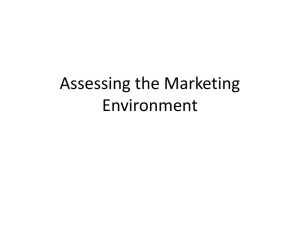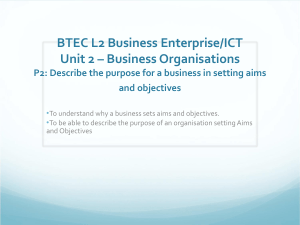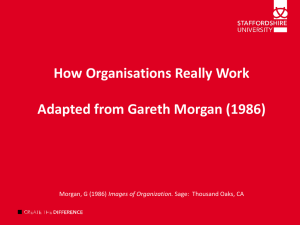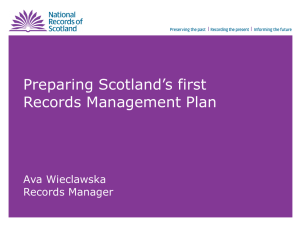Legal and Financial Compliance
advertisement
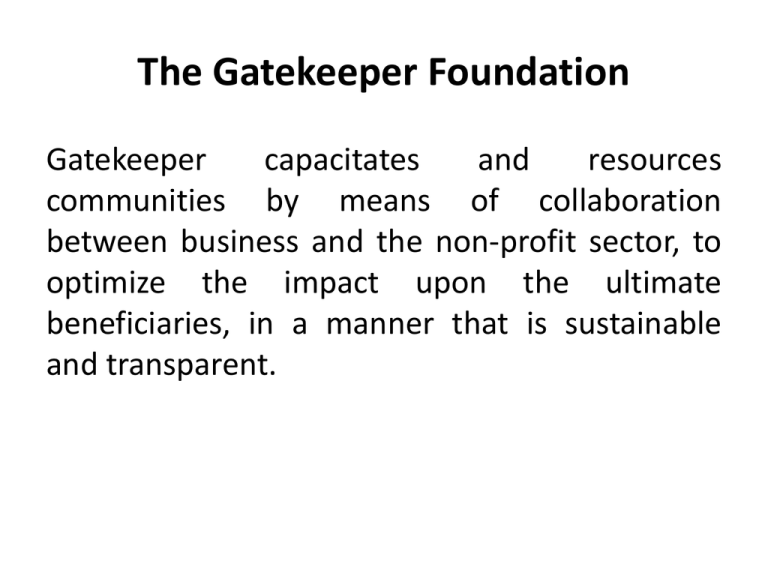
The Gatekeeper Foundation Gatekeeper capacitates and resources communities by means of collaboration between business and the non-profit sector, to optimize the impact upon the ultimate beneficiaries, in a manner that is sustainable and transparent. Legal and Financial Compliance In order for any organisation to succeed, it needs to have a proper structure and it needs to be financially and legally compliant. There is little difference between a start up enterprise and a start up non-profit organisation – an organisation with a proper structure may or may not succeed, but an organisation which is not legally and financially compliant, with a proper structure, is bound to fail. The Gatekeeper Foundation assists and supports non-profit organisations to become legally and financially compliant which will make it easier for such organisations to be sustainable and to access funding. Organisational structure An non-profit organisation can be a trust, company or other association of persons, established for a public purpose, whose income and property are not distributable to its members or office bearers, other than as reasonable compensation for services rendered. Legislative framework Non-Profit Organisations Act(No 71 of 1997) Companies Act Trust Property Control Act Income Tax Act Broad Based Economic Empowerment Act Non-profit Organisations Act Registration is voluntary. The purpose of the Act is to establish an administrative and regulatory framework within which non-profits can conduct their affairs. It is also a source of information, for example narrative reports must be filed on the work done by the non-profit organisation. Non-profit organisations Act- benefits of registration An NPO number Is issued and serves as proof that the organisation exists and is a legal entity. Funders can access the data base of the Department of Social Development to verify compliance with the Act. The website of the Department contains standard documentation such as a model constitution which is easy to use and there is no cost involved registering an organisation as an NPO. Non-profit Companies An organisation can come into existence by registering with the CIPC (the companies office) in terms of the Companies Act. It will do so by registering its name and filing its Memorandum of Incorporation (MOI) with the CIPC. The organisation will have the letters ‘NPC’ at the end of its name to indicate it is a not for profit company registered in terms of the Act. Companies Act The CIPC website contains a model MOI (memorandum of incorporation) for non-profit companies. An MOI serves the same purpose as a constitution of a voluntary association registered ito the NPO Act – it regulates the affairs of the NPC. An NPC can also register as an NPO ito the NonProfit Organisations Act but this is not compulsory. Benefits of registering as an NPC Organisations that tend to be more complex in structure, and which is likely to receive substantial funding should rather register as an NPC as the affairs of an NPC are regulated in terms of the Companies Act which sets a high standard of conduct for directors, and provide protection for members or beneficiaries (stakeholders) of organisations. Trust Property Control Act A non-profit organisation can come into existence with the registration of a Charitable Trust with the Master of the High Court. The trust deed will determine the manner in which the organisation (charitable trust) operates and will for example, set out the powers of the trustees. An Charitable Trust can also register as an NPO ito the Non-Profit Organisations Act but this is not compulsory. Benefits of registering as a charitable trust A high standard of ethical conduct is required of trustees. The trust deed is a creature of its own making, that means the trust deed can be drafted with great particularity to determine the manner in which the organisation is managed and controlled and disputes are resolved. The provisions of the Companies Act do not apply and the rights and interests of beneficiaries can be clearly set out in the trust deed. Registration as a PBO in terms of the Income Tax Act An organisation can register with SARS as a Public benefit organisation which would entitle it to tax relief It has to have an object (purpose) aligned to what is set out in the 9th Schedule to the Income Tax Act, for example: – the care and counseling of orphaned or vulnerable children, poverty relief, etc Benefits of being registered as a PBO The organisation itself would not pay income tax. The organisation itself would not have to pay transfer duty if it were to purchase property. No capital gains tax is payable. It can approach its municipality for rates relief on any property it owns. Donors gets tax relief and can donate up to 10% of its trading profits, tax free to a PBO. Non-profit organisations (NPO) as public benefit organisations (PBO) An NPO registered as a PBO may now conduct a trading activity or business undertaking where the activity is utilised as a source of funding for the approved Public Benefit Activity (PBA) This means that as long as the trade takes place in furtherance of the objective for which the organisation exists, for example poverty relief, tax exemption will apply, provided that the carrying on of the business does not in effect become the sole or principal object or activity. Tax Exemption for trading activities • The greater of 5% of the total receipts and accruals of the PBO or R100 000 will be exempt. EXAMPLE: Donations received R450 000 Rental income R90 000 Interest income R50 000 Total receipts R590 000 An amount being the greater of 5% of the total receipts iro trading activity or R100 000 will be exempt from tax. The full R90 000 will thus be exempt Vat Exemption A PBO may register for VAT, and claim the VAT that they incur as input tax and only levy output tax where they charge for the supply of goods and services. In conclusion Organisations who do have good financial management systems, is well managed and have a sound organisational structure will have a competitive advantage when it comes to funding. The Gatekeeper Foundation, in conjunction with its partners, wish to make it possible for every organisation, no matter how large or small, to be legally and financially compliant and its objective is to facilitate this and to assist with the building of capacity within organisations.



